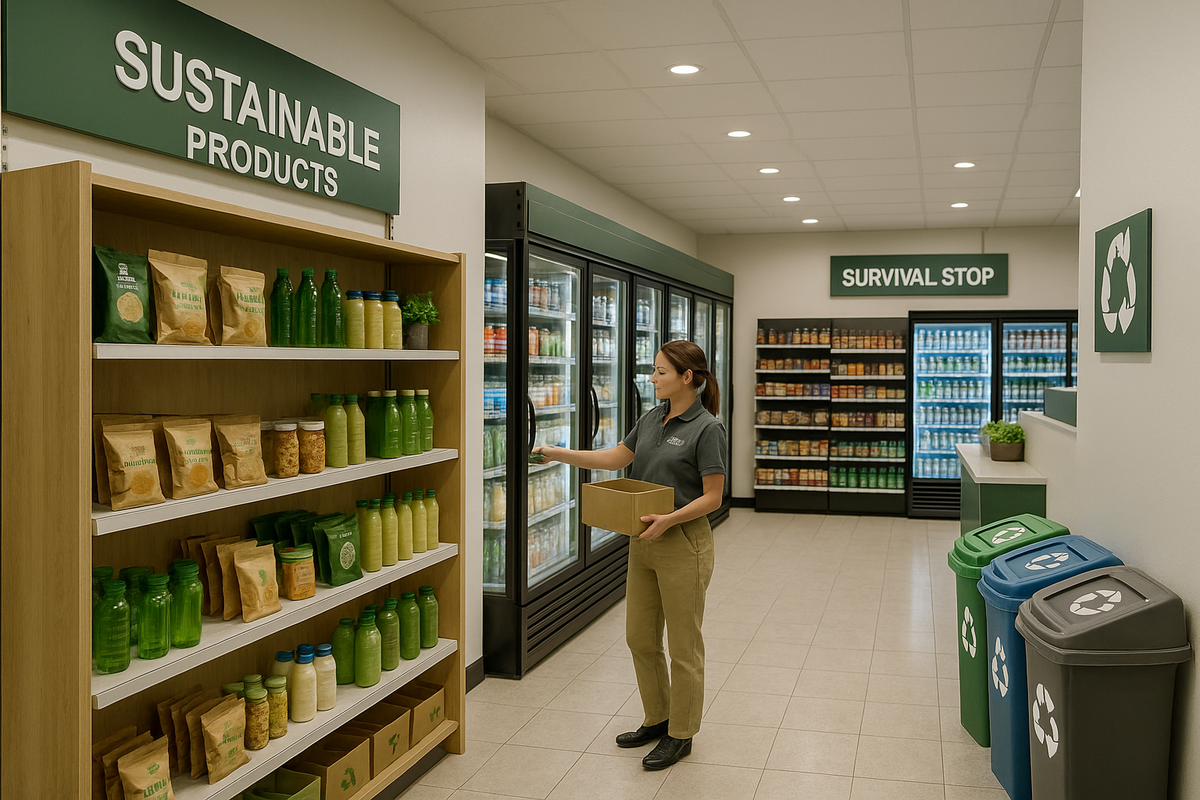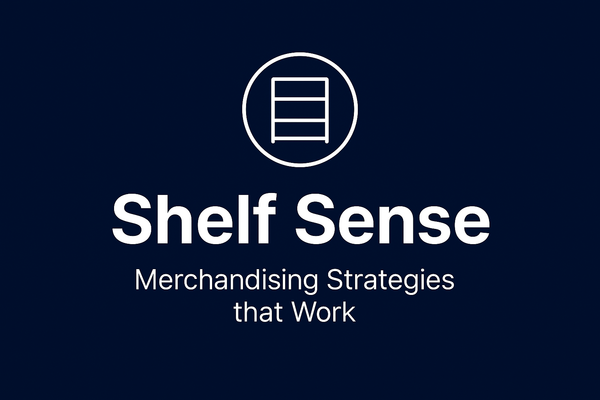What Is Sustainability in Convenience Stores?
Sustainability in convenience stores means operating practices that meet current business needs while preserving resources for future generations. It balances profitability with environmental responsibility through energy efficiency, waste reduction, and responsible sourcing.

When Rashid Patel took over his family's Survival Stop location three years ago, sustainability wasn't on his radar. But when his teenage daughter started asking why their store used so much plastic and wasted so much food, Rashid began questioning everything.
"She'd come home talking about climate change and environmental responsibility," Rashid recalls. "I realized our customers - especially younger ones - were starting to notice the same things. That's when I knew I needed to understand what sustainability actually meant for our business."
Today, understanding sustainability in convenience stores isn't just about environmental responsibility - it's essential for staying competitive and meeting evolving customer expectations.
Defining Sustainability in C-Stores
Sustainability in convenience stores refers to operating practices that meet current business needs while preserving resources and minimizing environmental impact for future generations. This approach balances profitability with environmental and social responsibility.
Environmental sustainability focuses on reducing ecological footprint through energy conservation, waste reduction, and responsible resource use.
Economic sustainability ensures green practices support long-term profitability rather than creating unsustainable costs.
Social sustainability addresses community impact, employee welfare, and ethical business practices.
Nadia Okafor discovered this balance: "Sustainability isn't just about being green - it's about building a business model that works for our community, employees, and bottom line over the long term."
The Three Core Pillars
Energy Efficiency and Management
Energy represents one of the largest controllable expenses, making it a natural sustainability starting point.
Lighting optimization through LED conversions can reduce energy consumption by 40-60% while improving store ambiance and reducing maintenance costs.
HVAC efficiency improvements through programmable thermostats and regular maintenance help control costs that often account for 30% of total energy use.
Equipment upgrades to energy-efficient refrigeration and food service equipment reduce operational costs while lowering environmental impact.
Chen Wei-Ming's energy focus delivered immediate results: "Switching to LED lighting and upgrading cooler systems cut our electricity bill by $400 monthly. The sustainability benefits were great, but the cost savings made it an easy business decision."
Waste Reduction and Management
Convenience stores generate significant waste through packaging, food spoilage, and disposable products. Effective waste management creates both environmental and financial benefits.
Food waste prevention through better inventory management, donation programs, and markdown strategies reduces disposal costs while supporting community organizations.
Packaging optimization includes working with suppliers to reduce excessive packaging, offering reusable bag programs, and providing recycling options.
Operational waste reduction focuses on digital receipts, reusable supplies, and efficient inventory systems that minimize overordering and spoilage.
Isabella Moreau's waste reduction proved profitable: "We partnered with a local food bank for items approaching expiration and implemented customer discounts for near-date products. Food waste dropped 35% while improving our margins."
Responsible Sourcing and Product Selection
Product sourcing decisions significantly impact overall sustainability while responding to growing consumer demand for ethical options.
Local supplier partnerships reduce transportation emissions while supporting regional economies and providing fresher products.
Sustainable product offerings include organic options, eco-friendly alternatives, and products from environmentally committed companies.
Vendor sustainability requirements help stores work with suppliers who share environmental values.
Rising Consumer Expectations
Modern consumers increasingly factor sustainability into purchasing decisions, creating market pressure for green practices.
Millennial and Gen Z shoppers particularly value environmental responsibility, with 73% willing to pay more for sustainable products.
Local community awareness has grown significantly, with customers discussing stores' environmental practices on social media and review platforms.
Tariq Abdullah noticed this shift: "Students started asking about our recycling program and commenting on plastic bag use. Younger customers were making shopping decisions based partly on our environmental practices."
Industry Pressures Driving Change
Beyond consumer expectations, several industry factors push convenience stores toward sustainable practices.
Regulatory compliance requirements continue expanding, with new laws governing waste disposal, energy efficiency, and plastic use.
Supply chain demands increasingly include sustainability criteria, with major suppliers expecting retail partners to meet environmental standards.
Competitive differentiation opportunities emerge as sustainability becomes a key factor distinguishing progressive stores from traditional operators.
Amira Hassan experienced regulatory pressure: "Our city passed waste reduction requirements that forced us to implement recycling programs. Instead of just complying, we used it as an opportunity to completely rethink our environmental approach."
Integration With Business Strategy
Successful sustainability integrates environmental practices with core business operations rather than treating them as separate initiatives.
Operational efficiency improvements often deliver both cost savings and environmental benefits, creating win-win scenarios.
Brand positioning around sustainability attracts environmentally conscious customers while differentiating from competitors.
Employee engagement frequently increases when workers feel proud of their workplace's environmental commitment.
Common Misconceptions
Cost assumptions lead some owners to believe sustainable practices always require major upfront investments, when many green initiatives actually reduce costs immediately.
Complexity concerns make sustainability seem overwhelming, but most successful programs start with simple changes that build momentum over time.
Customer indifference beliefs underestimate growing consumer awareness and preference for environmentally responsible businesses.
Taking the First Steps
Understanding what sustainability means provides the foundation for implementing practical green practices that benefit both business and environment.
Assessment and planning help identify the most impactful and cost-effective sustainability opportunities specific to each store's situation.
Gradual implementation allows stores to test approaches, measure results, and build expertise before expanding to more complex initiatives.
Community engagement creates opportunities to showcase sustainability efforts while building stronger customer relationships.
For practical guidance on implementing sustainable practices, check out our detailed resource on how c-stores can go green.
The Competitive Advantage
Sustainability in convenience stores represents more than environmental responsibility - it's becoming a competitive necessity as consumers, regulators, and industry partners increasingly expect green practices.
Stores that understand and implement sustainable operations position themselves for long-term success in a marketplace where environmental consciousness continues growing. What is sustainability in convenience stores? It's the future of retail operations that balances profit with purpose, efficiency with responsibility, and short-term needs with long-term viability.





